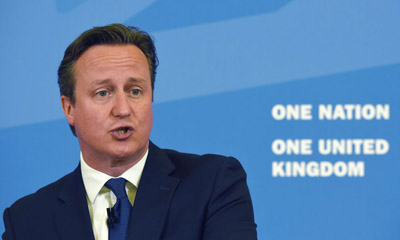Australia/Israel Review
Cameron’s watershed speech
Aug 28, 2015 | Sharyn Mittelman

Sharyn Mittelman
On July 20, UK Prime Minister David Cameron made a major policy speech on countering extremism, which is likely to have a “tremendous impact” and inspire other countries, according to Professor Alan Johnson, an expert in de-radicalisation who was recently in Australia as a guest of the Executive Council of Australian Jewry.
Johnson says that Cameron’s speech was “impressive” for a variety of reasons including that it addressed that “Islamist ideology” is in itself a problem and that it must be challenged “in an unapologetic way”. For example, Cameron’s speech stated:
“It begins – it must begin – by understanding the threat we face and why we face it. What we are fighting, in Islamist extremism, is an ideology. It is an extreme doctrine… But you don’t have to support violence to subscribe to certain intolerant ideas which create a climate in which extremists can flourish. Ideas which are hostile to basic liberal values such as democracy, freedom and sexual equality. Ideas which actively promote discrimination, sectarianism and segregation… And ideas also based on conspiracy: that Jews exercise malevolent power; or that Western powers, in concert with Israel, are deliberately humiliating Muslims, because they aim to destroy Islam.”
Johnson recalls that for many years there was a concern in the UK that to challenge Islamism was to be “Islamaphobic” but adds that fortunately the conversation appears to have “moved beyond that now”. He adds that in the past the UK government had “distinguished between Islamism and violent Islamism” but “now they are saying we are taking on both.” As Cameron said in his speech:
“As we counter this ideology, a key part of our strategy must be to tackle both parts of the creed – the non-violent and violent. This means confronting groups and organisations that may not advocate violence – but which do promote other parts of the extremist narrative. We’ve got to show that if you say ‘yes I condemn terror – but the Kuffar are inferior’, or ‘violence in London isn’t justified, but suicide bombs in Israel are a different matter’ – then you too are part of the problem. Unwittingly or not, and in a lot of cases it’s not unwittingly, you are providing succour to those who want to commit, or get others to commit to, violence.”
Cameron’s speech comes as around 1,000 Britons have left the UK to fight for ISIS in Syria and Iraq. There is a real concern that when these foreign fighters return to their homes they will not only be extremists but will have become “operationally capable jihadis”.
Johnson arrives at this debate with a strong understanding of the challenges the UK faces in countering extremism, having spent two years writing a study for the UK government that examined the journeys taken by young British Muslims ‘in and out of extremism’ and having developed strategies to counter radicalisation.
Johnson says that the UK government’s new strategy to fight extremism includes three central elements: counterterrorism, social cohesion and the battle of ideas. According to Johnson, it also sets out a new strategy whereby instead of the government supporting Islamist self-appointed leaders who are anti-Western but claim to be non-violent, the government will invest in emerging Muslim organisations that are liberal and professional. Examples of such groups in the UK cited by Johnson include the women’s network Inspire, the Muslim Armed Forces Association, and British Muslims for a Secular Democracy.
While Johnson has high praise for Cameron’s policy direction on counterterrorism, he expresses deep concern with the direction of his own political party, the UK Labour party. After Labour’s election loss earlier this year under previous leader Ed Miliband, Johnson believes the party is now in a “traumatic state”, requiring a significant swing to succeed at the next election in 2020. Currently, Jeremy Corbyn is leading the race to become the next Labour party leader, a prospect that could severely split the Labour party due to his extreme left-wing views. If the party was to split, it would further undermine Labour’s prospects for winning the next election, Johnson argues.
Johnson has spoken out against Corbyn becoming the future Labor leader, noting that he has called terrorist groups Hamas and Hezbollah “friends”. In an article in Left Foot Forward, Johnson explained why Corbyn would not get his vote:
“You won’t get it because Labour’s best traditions also include anti-fascism and internationalism while your support – to me, inexplicable and shameful – for the fascistic and antisemitic forces of Hezbollah and Hamas flies in the face of those traditions. In particular, your full-throated cheer-leading for the vicious antisemitic Islamist Raed Salah is a deal-breaker. Why did you lend your support to Raed Salah? No, he is not a ‘critic of Israel’, but a straight-up Jew hater.”
[Salah is a leader of the northern branch of the Islamic Movement in Israel, who was found guilty of spreading blood libel, has implied that Jews were responsible for 9/11, and has called homosexuality a “great crime”. He was hosted by Corbyn in Parliament house in 2012 and was effusively praised by him.]
Under Ed Miliband’s leadership the Labour party adopted a more critical approach to Israel, Johnson noted. If Corbyn is to become the party leader he would no doubt take that criticism much further.
Johnson believes that UK Labour’s moves away from supporting two states for two peoples via direct negotiations towards becoming critical of Israel alone, is a mistake not only in terms of foreign policy but also with respect to UK public opinion. He argues it is wrong to believe that “Israel has peace in the palm of its hands” if only it would offer it to the Palestinians. Johnson notes that in the latest round of peace talks, it was again the Palestinian Authority who walked away from negotiations to sign a unity agreement with Hamas. He adds that Israel cannot simply unilaterally withdraw from the West Bank, because security experts predict the PA could fall to Hamas in a matter of weeks, creating new threats not only to Israel but also for Western interests.
Regarding opinion polls, Johnson notes that only around 20% of the UK is strongly critical of Israel, and that they just happen to be the ones with the loudest voices. Johnson believes the “responsible” approach in terms of both foreign policy and winning election votes, is for the Labour party to retain a balanced position on the Israel-Palestinian conflict that continues to support two states for two peoples.
This article is featured in this month’s Australia/Israel Review, which can be downloaded as a free App: see here for more details.
Tags: Islamic Extremism






